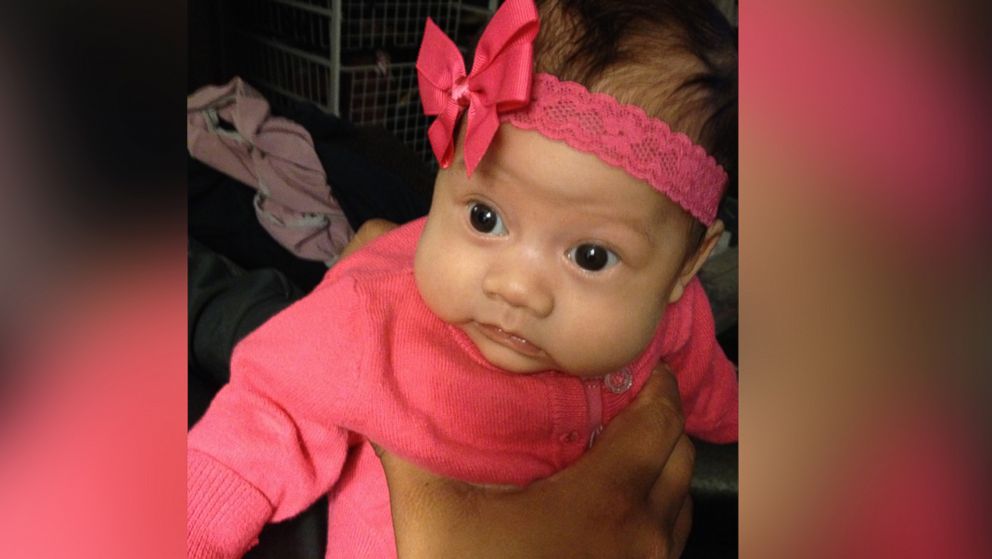


Jennifer Juarez had a gut feeling that something was wrong when her baby, who had kicked up to 10 times in a half hour during the latter part of her pregnancy, suddenly went still.
Hope was delivered three weeks early in December 2013 by emergency cesarean section, but she was so pale at birth that when doctors tried to prick her foot to measure oxygen levels, they could barely get a drop of blood.
About 80 percent of her blood had drained from her body due to a fetal-maternal hemorrhage.
"When they first pulled her out, she looked perfectly fine," said Juarez, 27, of Fountain Valley, Calif. "But she was ghost white. She was breathing like a normal baby, but she had no color to her--not even pink."
Watch a report on Hope Juarez's birth from ABC's affiliate KABC.
Hope, who was 6 pounds, 2 ounces, had a hemoglobin level of 3.8; an average baby should be between 10 and 15, according to doctors.
So-called "ghost white babies" are rare, and those that do not die in utero or are still born, can have neurological damage, according to the National Institutes of Health. The biggest signal of fetal-maternal hemorrhage is decreased fetal activity.
But Hope was lucky because of her mother's instinct, according to Dr. Marielle Nguyen, a neonatologist at Kaiser Permanente, Irvine Medical Center, where Hope was born. She said all indications are that the baby will have no problems.
"We have seen this, but not often," said Nguyen. "In Hope's case, her outcome was beautiful because it was the classic textbook case they tell you about. The mom knew right away that she had a clue something was wrong. She couldn't feel the baby move. And she came in right away and we delivered the baby. If we had waited any longer, the outcome would have been different."
Nguyen said she didn't know what happened to cause the fetal-maternal hemorrhage. Sometimes a trauma to a pregnant woman's abdomen or a car or motorcycle accident can cause the placenta to separate from the uterine wall.
"A lot of times it's spontaneous," she said. "In a normal pregnancy the baby loses a little bit of blood, but it's rare to lose more. When she came out, she had lost so much it was difficult to draw any blood from her."
Babies who lose this amount of blood can survive for some period of time before birth because the mother and baby's circulation are "joined," according to Nguyen. But Juarez's "instinct" and prompt response likely saved the baby.
Dr. Jennifer Ashton, senior medical contributor to ABC News and an ob/gyn, agreed a mother's observations of her baby's kicks are an "important indicator" of fetal well-being or distress.
"In reality, the term 'ghost-baby' and description of 'being born without any blood' are not really accurate," she said. "I have definitely seen many cases of feto-maternal hemorrhage and while this particular case is very severe, babies can absolutely survive."
Hope was the first child for Jennifer, who works for work for the Orange County Trafficking Task Force, and Josh Juarez, 30, a soccer coach, who also works in elder care.
Her pregnancy, like 98 percent of others who experience fetal-maternal hemorrhage, was completely normal.
"I absolutely felt blessed," said Jennifer Juarez. "I was completely fine while all my other friends were either sick or had issues during their pregnancies. I felt so lucky."
But at about 37 weeks, she said the baby seemed to stop moving. "Every morning I felt kicks -- she was very active and always moving," said Juarez. "So I did all the things they tell you to do--I drank cold water, lay down for a while and ate some sugar. I felt something was off, but I wasn't sure."
Jaurez had an afternoon appointment with her midwife and mentioned her concerns. Everything still seemed normal, but Juarez was sent to the hospital to be checked out.
An ultrasound showed that Hope's heart rate was starting to drop. "It was all a bit of a blur and a little chaotic," said Juarez. "It was scary."
Juarez was rushed into surgery and after doctors determined Hope was missing so much blood, she was transfused.
"She's quite a fighter," said Hope's mother. "She latched (on the breast) right away. Babies with brain damage don't."
Doctors are still watching Hope for any signs of delay in her development until she is six months old. But so far, all seems normal.
"She's doing everything a baby at her age should be doing," said Juarez. "She is smiling and lifting her head and eats really well. She has hit all her markers."
"It's so amazing she was able to survive and do so well," she said. "We are thinking God must have a special plan for her. Everyone asked us if we had named her after the situation. We didn't. But it was meant to be."
Nguyen agrees. "They say she is a miracle. Her name is very appropriate."